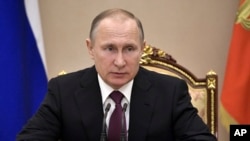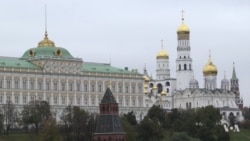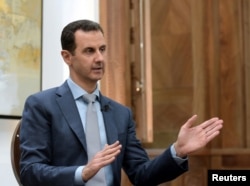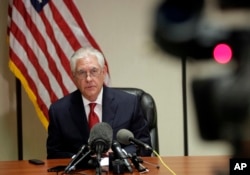Russia on Friday condemned the U.S. strike on a government-controlled air base in Syria, saying it would increase Syria's air defenses in reaction.
Russia called the attack an aggression against a sovereign state and a violation of international law under false pretenses. Russian presidential spokesman Dmitry Peskov said the U.S. cruise missile attack was effectively helping Islamist militant groups active in Syria, including the so-called Islamic State group and al-Qaida-linked al-Nusra.
"We don't yet know what goals Washington wanted to achieve by deciding to carry out these strikes, but it is unequivocally clear that the strikes were de facto carried out in the interests of Islamic State, Jabhat al-Nusra and other terrorist organizations,” said Peskov.
WATCH: Russia's Suspension of US Cooperation on Syrian Airspace Elevates Risk of Clash
Damascus and Moscow say the air base was used for launching bomber jets that were targeting terrorists inside Syria. The United States says it was used to deliver a chemical weapons attack Tuesday in Idlib province that killed scores of civilians, including a number of children.
U.S. President Donald Trump ordered the strike of Tomahawk missiles after weighing military responses to what the U.S. says was a deliberate gas attack on civilians.
Russia has backed Syrian government claims that the poisonous gas was released from chemical weapons stored by Syrian rebels in buildings destroyed during fighting.
Russia’s Defense Ministry Friday said Washington planned the Syria strikes before the chemical weapons victims emerged in Idlib, but offered no evidence.
Russia’s Foreign Ministry suspended an airspace safety memorandum with the United States for Syria.
The agreement, which minimized the risk of accidents by communicating flight paths, was made after Moscow in September 2015 began a bombing campaign against rebels and jihadists in support of Syrian President Bashar al-Assad.
U.S.-led coalition planes from Western and Gulf states were for some years already bombing Islamist fighters in Syria, making for crowded skies and the possibility of incidents.
Suspending the agreement elevates the risk of direct clashes there between Russian forces and the U.S.-led coalition.
“When Russia suspended this memorandum it means that first, Americans do not need to inform Russia before (the) next strike and, Russia wants to have open hand to do anything it wants in response,” said deputy editor of Yezhenedelny Zhurnal (Weekly Journal) Alexander Golts. “So, it makes (the) possibility of direct conflict much more possible than it was two days before.”
Syria says several of its troops and civilians were killed in the airstrike, which destroyed a number of planes and buildings at the air base.
There were no Russian casualties reported and the Kremlin acknowledged the U.S. notified it in advance so it could remove personnel from the site.
Despite having anti-missile systems in Syria, and the warning time, Russia apparently made no attempt to intercept the Tomahawks, raising some questions.
“I do not understand why Russia did not protect Assad in this case,” says political analyst Alexei Malashenko. “Maybe it is impossible. I do not know if something can be done against Tomahawks. It is a question for militaries. But, at the same time, there is a broader issue: is Russia able to protect Assad in case of the next aggression? It means that Assad is not totally protected by Russia and it proves a weakness of Russia.”
“It’s a big question for me,” says Golts. “(Can Russia) intercept American cruise missiles or did they reject this idea?”
The Kremlin, while backing the Syrian government, has consistently said its support of Assad is not without limits.
“From the very beginning ...the prime goal for this (Russian military) presence, was not (the) fight against so-called terrorists,” says Golts. “The prime goal of (the) Russian military operation was to push Americans to speak with them. And, in fact, it was clear blackmail. ‘You should speak with us or any accidents can be possible.’ And, this way he undermines all Russian attempts to use military force in Syria as (a) serious instrument in its international policy.”
The increase in tensions comes just days ahead of a visit by U.S. Secretary of State Rex Tillerson to Moscow, where he is expected to meet Wednesday with Russian leaders.
Tillerson had tough words for Moscow ahead of his visit. He said the Tuesday gas attack showed Russia failed to carry out a 2013 agreement to secure Syrian chemical weapons and was either complicit or incompetent.
Nonetheless, there were no indications that Russia would make any changes to Tillerson’s scheduled meetings. The International Affairs Committee of Russia’s parliament, the Duma, said the U.S. strikes should not impact Tillerson's Moscow visit.
"Of course I am upset that all of this brings more damage to already frayed relations between Russia and the United States,” said Foreign Minister Sergei Lavrov. “But I hope these provocations will not lead to some kind of irreversible consequences."








